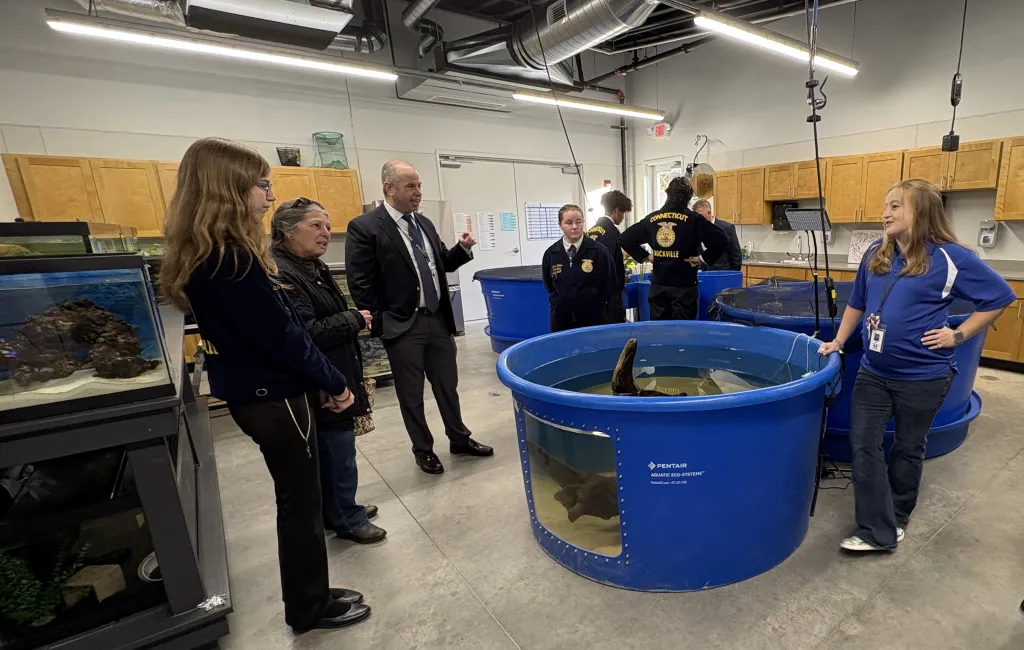Copyright Hartford Courant

Leah Mocko, a science teacher at Rockville High School, has spent the last two years planning, designing and implementing a new $1.7 million lab that is now housing the school’s aquaculture program, in the hopes of fostering a new generation of scientists in a booming career field. Rockville’s new aquaculture facility, now up and running, is part of the high school’s Agriculture Science And Technology Education program. The new lab space adds to the program’s already-successful animal and plant science offerings. The ASTE program serves as a regional vocational school for students from Bolton, East Windsor, Ellington, Manchester, Somers, South Windsor, Stafford, Tolland, Union and Vernon. Mocko, who grew up along the shoreline near Mystic, said she developed an interest in marine life and the biodiversity of the ocean from a young age. She now heads up the high school’s aquaculture science program after previously leading a similar program in Suffield for several years. After her successful tenure there, she said Rockville officials asked her to help set up a program in the town. The new space, made possible by state grant money, took a year of planning and then another year of construction. Aquaculture involves the farming of aquatic organisms, including fish, shellfish and plants, in controlled environments like freshwater and saltwater systems. The process is accomplished through breeding, rearing and harvesting live organisms for commercial, recreational or conservation purposes, Mocko said. While the school offered an aquaculture program for several years, it was small and inside the program’s mechanic shop. The new building expands the program and gives students new opportunities to learn about an important aspect of agriculture in Connecticut, according to Mocko. “It’s been a blessing to be given this opportunity. I’ve built this space I get to live in and teach in everyday,” Mocko said. “Designing what tanks I wanted, the sizes, and what species would go in them was a really fun experience. I wanted to make sure the students got a variety of cold water, tropical and fresh water species. So it was a lot of fun mapping it all out, and it’s great to see it come to fruition.” The new facility is half classroom and half lab, according to Mocko. The lab contains around 20 tanks ranging from one-gallon goldfish tanks to 500-gallon industry production tanks for tilapia, allowing students to raise a variety of fish species in different settings. Species range from goldfish, tetras, African bullfrogs, slider turtles and some saltwater tanks that include tropical fish like clownfish. “It’s awesome because it’s an easy transition from students learning in the classroom to then applying that to hands-on learning,” Mocko said. “We will be adding more saltwater species like sea anemones, urchins and sea stars. Basically whatever the students are learning in the classroom, I try to make sure they also are able to see up close in the aquaculture lab.” The building is also home to a variety of freshwater fish, two freshwater stingrays named Neville and Luna, frogs, two large tortoises and numerous plants, she said. Aquaculture is big business and a booming career field, according to Mocko. Global fisheries and aquaculture production reached an all-time high of 223 million tons in 2022, with aquaculture alone producing 94 million tons. The global aquaculture market was valued at $204 billion in 2020, and is projected to reach $262 billion by 2026, according to food and agriculture data from the United Nations. “There is definitely a big need right now, shellfish and kelpfish farming are huge needs here in Connecticut. Students often overlook this important career field simply because they may not know about it. So I’m trying to let students know that this is an option,” Mocko said. “I even teach students you can breed ornamental fish species in your basement and have a side job. You can make thousands of dollars a year selling fish, especially as people want more rare varieties for their fish tanks.” ASTE department head Erika Bahler said the new building is a step forward for the entire ASTE program. “It’s a pathway that we would like to continue to grow,” Bahler said. “We do find a number of students are interested in marine biology or aquaculture.” The aquaculture equipment used to be housed in the department’s mechanic shop. The move will allow both programs to expand and do more.” The ASTE program offers career-focused education in animal science, agricultural mechanics, plant science and biotechnology. In addition, the program has a local chapter of the National FFA Organization, providing leadership development and community service opportunities for students. Students in the ASTE program take exploratory classes in their freshman year and pick a concentration once they are sophomores. The aquaculture classes are a large part of the natural resources pathway with sustainable fisheries, according to Rockville High School Principal Jason Magao. In total, there are 21 agricultural education schools spread throughout Connecticut, with each one having some kind of an aquaculture program. But with the new lab and classroom space, Rockville’s aquaculture program is now among the largest in the state, Magao said. “The aquaculture program was not as popular because we didn’t previously have a great facility,” Magao said. “But we have an open house next week, and I know there will be a lot more students interested now.” The open house will take place on Nov. 6 at Rockville High School. Prospective students and parents can tour the new facility and learn more about the ASTE pathway programs. “Our students are super excited to have this space and be able to put new species in the lab they never had before,” Magao said. “We also are looking to expand our touch tanks to bring elementary students in to visit and learn. So they are really excited about that and being able to connect with our younger generations.” There are 165 students currently enrolled in the ASTE program, nearly double the amount a decade ago, he said. Magao, who has been involved with the ASTE program since 2015, became principal of the high school in 2020. “This center represents more than just tanks and equipment — it’s a living classroom where students will explore marine biology, environmental stewardship and sustainable food systems,” Magao said. “It’s a place where passion meets purpose.” Stephen Underwood can be reached at sunderwood@courant.com.



